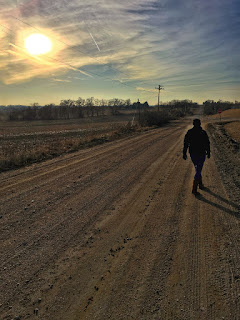 As of mid-December, the place I’ve called home
is Ashland, NE. From 1967 to mid-1985, this is the same small town where I
lived. Where I grew up. Where I left. At 18, I couldn’t wait to get out. Couldn’t
wait to escape. Couldn’t wait to take any of the roads that led to Highway 6 and
beyond. To head east or west. North or south. To see what I could find. To break
out. I knew I had to.
As of mid-December, the place I’ve called home
is Ashland, NE. From 1967 to mid-1985, this is the same small town where I
lived. Where I grew up. Where I left. At 18, I couldn’t wait to get out. Couldn’t
wait to escape. Couldn’t wait to take any of the roads that led to Highway 6 and
beyond. To head east or west. North or south. To see what I could find. To break
out. I knew I had to.
Not because I held any deep resentments against my place
of origin. I didn’t. It was the opposite really. I knew what I had there. At
18, I just hadn’t learned to appreciate it yet.
In many ways, my upbringing was idyllic.
Small town parades. Friends to play with up and down the block, and the block
past that one and all the ones past those. Swimming pool friends in the summer.
Picking green apples off trees. Back trails that cut precious minutes off the
walks required to get anywhere and everywhere.
 Fishing in the creeks. Paper route in the
morning. Bike pedaling all day long. A dime store on the corner. A bowling
alley downtown. The Gateway Inn for a hamburger on a Friday night.
Fishing in the creeks. Paper route in the
morning. Bike pedaling all day long. A dime store on the corner. A bowling
alley downtown. The Gateway Inn for a hamburger on a Friday night.
Train tracks running straight through town.
Sledding hills spilling downward. Climbing trees standing tall in the park. Narrow,
cracked streets to exhaust steps on at night with a gang of friends. Schools
dances with sweaty palms. Girlfriends to plot impossible dreams with. Country
roads to kick up dust.
It was pre-cable television. Pre-Internet
surfing. Pre-mobile phone distractions. Use what you had to pass the time and
not pass the time lamenting what didn’t. And freedom. So much freedom. Probably
too much. Probably undeserved. But essential to being really born and really
coming alive.
 And still, despite the innate protection and
security and comfortableness that a small town can pour over its people, there
was a sense of isolation I tasted in the air. A bubble that formed. A naiveté I
choked on. About the expanse that existed outside the streets that reined in the
familiar. About the ideas, perspectives, possibilities, and scenery I was temporarily
exposed to whenever we ventured beyond those imaginary boundaries. That newness
spoke to me. Strongly. Clearly. Purposely. I wanted to see more. Hear more.
Feel more. Explore me. Find more.
And still, despite the innate protection and
security and comfortableness that a small town can pour over its people, there
was a sense of isolation I tasted in the air. A bubble that formed. A naiveté I
choked on. About the expanse that existed outside the streets that reined in the
familiar. About the ideas, perspectives, possibilities, and scenery I was temporarily
exposed to whenever we ventured beyond those imaginary boundaries. That newness
spoke to me. Strongly. Clearly. Purposely. I wanted to see more. Hear more.
Feel more. Explore me. Find more.  So, I got out. I embraced the unfamiliar
voices. I welcomed the new faces. The new streets. The new buildings. The new
ways of identifying and solving problems. The new conversations. New choices.
New dangers. New challenges. New obstacles. New intentions. New possibilities.
And I liked what I saw.
So, I got out. I embraced the unfamiliar
voices. I welcomed the new faces. The new streets. The new buildings. The new
ways of identifying and solving problems. The new conversations. New choices.
New dangers. New challenges. New obstacles. New intentions. New possibilities.
And I liked what I saw.
But I always kept coming back. Always kept
tabs on the town my parents never left. The town many relatives and friends
never stepped away from. The town I never stopped feeling a kindred spirit with.
The town that brought temporary peace whenever my car wheels touched the faded
red bricks that line Silver St. Bricks that better men than me lined one by
one.
 Over time, a town takes on a certain
character. Within you. Within the people who live there. Within the people who
visit. Within the people who stay and within those who leave. That character takes
on a different form for each soul. A different shape. It tastes slightly
differently. It beckons and repels slightly differently. For some, the character
drips sadness. For others, that character represents pride. For some, it’s
innocence that dominates. For others, that character signals stagnation. For
others, promise. For me, the character of my hometown has always sung peacefulness.
Calmness. An authentic silence. A welcomed silence. Silence in which to think. Resolve.
Partake. Retreat. Rethink. Retool. Re-establish. Revel in a pace more desirable.
Accept that there’s less availability but fewer distractions. For me, the
character of my hometown encourages me to just be.
Over time, a town takes on a certain
character. Within you. Within the people who live there. Within the people who
visit. Within the people who stay and within those who leave. That character takes
on a different form for each soul. A different shape. It tastes slightly
differently. It beckons and repels slightly differently. For some, the character
drips sadness. For others, that character represents pride. For some, it’s
innocence that dominates. For others, that character signals stagnation. For
others, promise. For me, the character of my hometown has always sung peacefulness.
Calmness. An authentic silence. A welcomed silence. Silence in which to think. Resolve.
Partake. Retreat. Rethink. Retool. Re-establish. Revel in a pace more desirable.
Accept that there’s less availability but fewer distractions. For me, the
character of my hometown encourages me to just be.  Nothing stays the same, nor should it. My
new hometown isn’t the same old hometown I left as a teenager. Some names are
the same, but many are not. There’s greater diversity. More businesses. More
choices. More wealth on display. Everything is bigger. Everything is smaller.
Everything feels alien but simultaneously well-known.
Nothing stays the same, nor should it. My
new hometown isn’t the same old hometown I left as a teenager. Some names are
the same, but many are not. There’s greater diversity. More businesses. More
choices. More wealth on display. Everything is bigger. Everything is smaller.
Everything feels alien but simultaneously well-known.
And then there are the finer details. To uncover.
To circle around. To appreciate. At 18, the finer details escaped me. I was too
busy plotting my path to reach what awaited outside to notice their presence. That’s
no longer the case. Now, the finer details are vivid and entirely apparent. And
they’re welcomed.
I’ve been thinking some about Thomas Wolf
the past few months. About separating reality from nostalgia. About weighing fond
remembrances against what’s really best. Best for myself. Best for my family.
Best for the future. But I’m finding verification in the details. The finer
details. The kind of details that existed all along. I just had to grow up,
leave, and then come back to notice them.